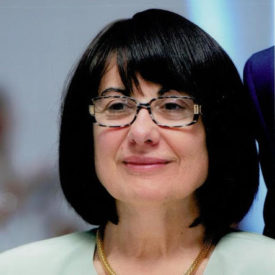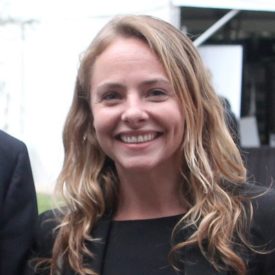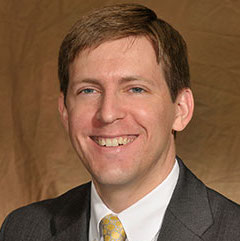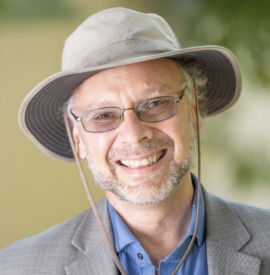
Jasmina Vujic, Director of NSSC
Professor, Department of Nuclear Engineering UC Berkeley
4105 Etcheverry Hall MC 1730
Berkeley, CA 94720-1730
Email: vujic@nuc.berkeley.edu
Phone: 510-643-8085
Fax: 510-643-9685
Jasmina Vujic is a Professor of Nuclear Engineering at UC Berkeley, and Program Director of the NSSC. Her research focus includes Neutronics Analysis of Fissile Material Behavior in Geologic Repositorie, Computer Modeling for Radiation Diagnostic and Cancer Therapy, Development of Multiprocessor Multiassembly Neutron Transport Theory Code, Development and Validation of the GT-SCALE Code Package for Advanced Rector Core Design, and the Development of a Unified Multidimensional Computational Method for Neutral Particle in Complex Non-Uniform Domains.

Bethany L. Goldblum, NSSC Executive Director
Member, Department of Nuclear Engineering
2150 Shattuck Avenue, Suite 230
Berkeley, CA 94720-1730
Email: bethany@berkeley.edu
Phone: 510-643-8085
Fax: 510-643-9685
Dr. Bethany L. Goldblum is a research engineer in the Department of Nuclear Engineering at the University of California, Berkeley, and a staff scientist in the Nuclear Science Division at Lawrence Berkeley National Laboratory. She is the Founder and Director of the Nuclear Policy Working Group, an interdisciplinary team of undergraduate and graduate students focused on developing policy solutions to strengthen global nuclear security. Goldblum also serves as Director of Education for the Nuclear Science and Security Consortium, a $25M grant established by the National Nuclear Security Administration to train the next generation of nuclear security experts, and Director of the 2014 Public Policy and Nuclear Threats Bootcamp. Goldblum received a Ph.D. in Nuclear Engineering from the University of California, Berkeley in 2007. She served as a Clare Boothe Luce Chancellor’s Postdoctoral Fellow at Berkeley before joining the nuclear engineering faculty at the University of Tennessee, Knoxville in August 2010. In January 2012, she returned to Berkeley as a member of the research faculty. Her research interests are in the areas of fundamental nuclear physics for nuclear security applications, nuclear-plasma interactions, scintillator characterization, and nuclear energy and weapons policy. Goldblum maintains active collaborations with the United States Department of Energy national laboratories and is an affiliate at Lawrence Berkeley, Lawrence Livermore and Sandia National Laboratory. She is author or co-author of over 45 scientific publications and presentations.

Jason Hayward, NSSC Deputy Executive Director
UCOR Fellow, Associate Professor. Department of Nuclear Engineering, The University of Tennessee, Knoxville. Email: jhayward@utk.edu
Jason Hayward UCOR Fellow, is an Associate Professor of Nuclear Engineering at the University of Tennessee. Hayward holds joint faculty appointments with Oak Ridge National Laboratory and the joint UTK-ORNL Bredesen Center for Interdisciplinary Research. He also serves as a Deputy Executive Director for the Nuclear Science and Security Consortium. Hayward is the recipient of a DOE Science CAREER award. ASEE has also recognized him with a New Faculty Research Award and as a ‘faculty under forty’ highlight. At UTK, he’s the recipient of a University Citation for Professional Promise in Research and Creative Achievement and a four time recipient of research awards in the College of Engineering. Hayward is an IEEE Senior Member and an Associate Editor for IEEE Transactions on Nuclear Science. He holds a PhD in Nuclear Engineering and Radiological Sciences from the University of Michigan. Prior to his time in academia, Hayward served as a U.S. Naval Officer for eight years. Hayward’s current research focus is sensor and system development for radiation imaging, as well as algorithms for improved, quantitative analysis of the generated data.

Kai Vetter, NSSC Liaison to NNSA
Office: 4171 Etcheverry Hall
Email: kvetter@nuc.berkeley.edu
Phone: (510) 643-2065
Fax: (510) 664-9078
Professor Vetter teaches the core NE104 course, “Radiation Detection and Nuclear Instrumentation Laboratory” which combines lectures and laboratory work to teach the basic concepts, implementations, and operations in radiation detection. In addition, he teaches NE107, “Introduction to Imaging”, an introduction to medical imaging physics and systems, including X-ray radiography and Computed Tomography (CT), radionuclide imaging (planar imaging as well as Single Photon Emission Computed Tomography (SPECT) and Positron Emission Tomography (PET)), and Magnetic Resonance Imaging (MRI). Examples of advanced concepts that are being discussed are the recently developed phase-contrast X-ray imaging and hyper-polarization MRI In Fall 2011 Professor Vetter introduced the new graduate level course NE204, “Advanced Concepts Concepts in Radiation Detection”. This course also combines lectures and experiments, however, focuses on advanced concepts in radiation detection ranging from basic and advanced digital filters for signal proceissing in semiconductor and scintillator detectors to radiation imaging. Gamma-ray imaging concepts based on pinhole, parallel-hole, and coded aperture collimators as well as Compton imaging are being demonstrated employing 3D postion sensitive segmented germanium detectors. Neutron imaging is explored based on the neutron scatter camera concept employing an array of liquid scintillators.

Lee Bernstein, Director for Laboratories
Adjunct Professor, Department of Nuclear Engineering UC Berkeley
Email: labernstein@berkeley.edu
Lee Bernstein leads the Bay Area Nuclear Data (BAND) group at Lawrence Berkeley National Lab and the University of California, Berkeley. BAND works to address the nuclear data needs of basic and applied nuclear science while training the next generation of nuclear scientists and engineers. This includes measuring cross sections for the production of radioisotopes for medical, national security and energy applications[1],[2],[3], determining nuclear properties important for accurate reaction[4],[5] and fission[6] modeling and developing new high-intensity neutron sources for isotope production[7],[8] and neutron scintillator characterization[9].
Dr. Bernstein earned his Ph.D. in Nuclear Physics from Rutgers University in 1994 and spent the next 22 years at Lawrence Livermore National Laboratory (LLNL) as a staff scientist studying a wide array of topics including high-spin nuclear structure; neutron cross section measurements; understanding the properties of hot nuclear matter and the development of the surrogate ratio method. Dr. Bernstein helped develop the nuclear science and diagnostics program at the National Ignition Facility (NIF)[10] serving as both the deputy and group leader.
Dr. Bernstein is an adjunct professor in the UC Berkeley Department of Nuclear Engineering where he teaches the upper-level nuclear physics course (NE101/210M) and has developed two courses on nuclear physics in high energy density plasmas (290J) and applied nuclear science related to non-proliferation (290A). Prof. Bernstein has supervised more than 30 post-doctoral researchers and graduate students and published more than 170 articles.
Dr. Bernstein is a fellow of the American Physical Society and a recipient of numerous awards including a Defense Programs Award of Excellence for determining the 239Pu(n,2n) cross section using a combination of experiment and theory and a LLNL Director’s Science and Technology Award for the Development of Gaseous and Solid Radchem at the National Ignition Facility.
